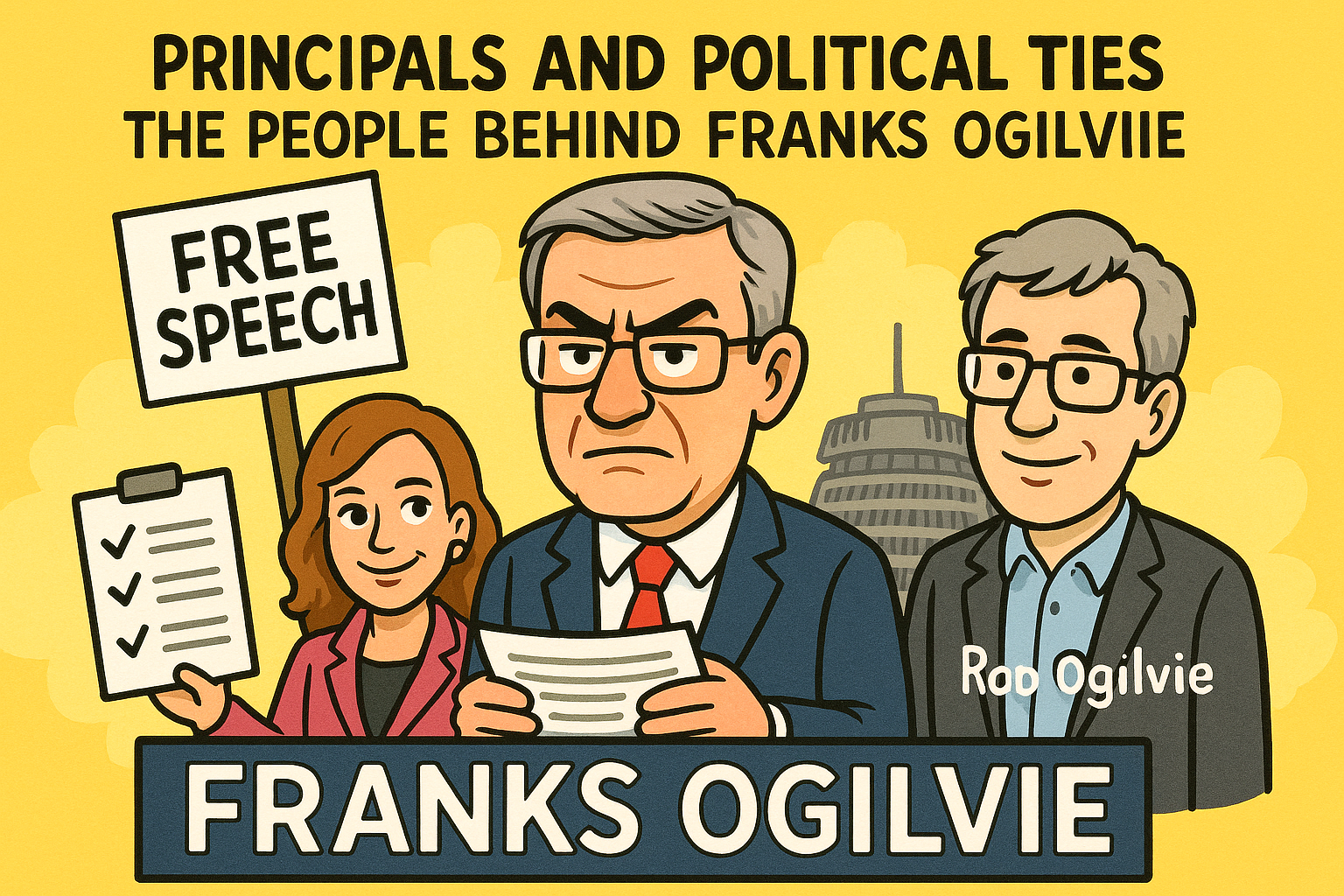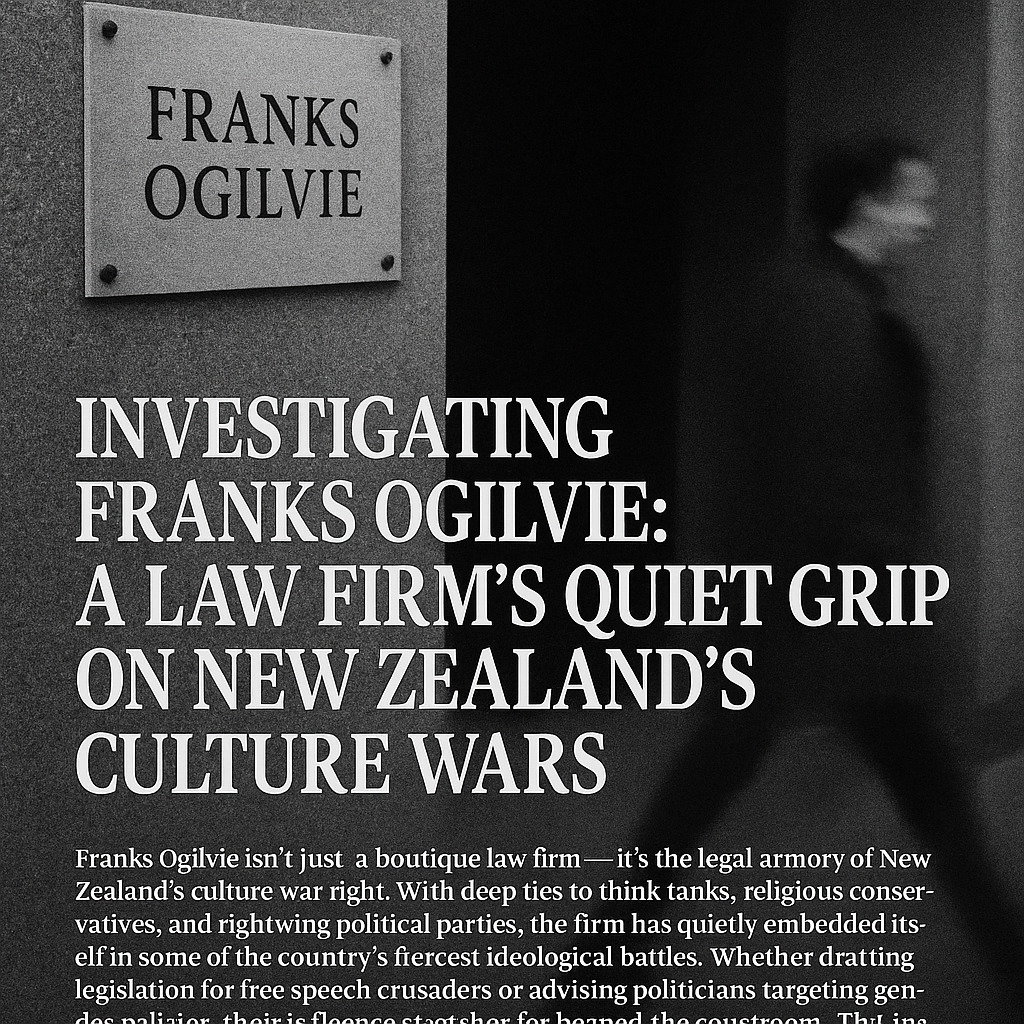Stephen Franks – From Parliament to Culture Warrior

Principals and Political Ties: The People Behind Franks Ogilvie
The character and conduct of Franks Ogilvie are very much shaped by its three directors. Stephen Franks, Brigitte Morten, and Rob Ogilvie each bring a distinct background straddling law and politics, and each plays a role in the firm’s advocacy. Understanding who they are is key to understanding why this firm behaves more like a political actor than a traditional law practice.
Stephen Franks – From Parliament to Culture Warrior
Stephen Franks is Franks Ogilvie’s most prominent name. A commercial lawyer-turned-politician, Franks has long mingled in New Zealand’s corridors of power. In the late 1970s and 1980s he rose to partner at Chapman Tripp, one of NZ’s largest law firms, even serving as chairman of its board. But he left Big Law for politics, spending six years as a Member of Parliament for the ACT Party (1999–2005). ACT, a right-wing classical liberal party, suited Franks’ free-market, tough-on-crime outlook. He was known for outspoken views in Parliament, often skeptical of what he saw as political correctness or government overreach. After 2005, Franks switched allegiances to the larger center-right National Party, standing (unsuccessfully) as National’s candidate for Wellington Central in 2008. Though he didn’t re-enter Parliament, this move cemented his ties with National’s network. By 2009, Franks returned to law – but not to the corporate fold. He co-founded Franks Ogilvie as a boutique firm where he could blend legal practice with his political passions.
Stephen Franks’ imprint on the firm is ideological and strategic. He is unabashedly opinionated: a self-described “politician manque” (politician manqué) on his social media, he blogs and speaks frequently on everything from free speech to firearm rights. Importantly, Franks doesn’t just represent clients – he often is the client or campaigner. He served as a board member (effectively the only officer) of the Water Users’ Group incorporated society that he helped create. He has been a public spokesperson for the Free Speech Union and related initiatives, writing essays defending figures like Albert Einstein College’s controversially platformed academics and castigating media “hit jobs” against right-wing voices. During COLFO’s gun law fight, Franks was omnipresent, giving press interviews and legal commentary on why the new laws were “unfair” to lawful gun owners. And when Inflection Point NZ organized its anti-trans “Unsilenced” conference, Franks not only handled their legal needs but reportedly sat in the audience at the event, a silent endorsement of the cause. In short, Stephen Franks has leveraged his status as a senior lawyer to legitimize and amplify conservative positions that might otherwise struggle for institutional respect. His critics see a pattern of using legal threats as a political cudgel – as one commentator put it, an environment where “a lawyer of Franks’ seniority” is doing something “extremely troubling” in essentially bullying healthcare providers. Admirers, however, view him as a principled defender of civil liberties and the rule of law against fashionable “woke” policies. What is clear is that Franks’ past as an ACT Party law-and-order advocate and National Party insider informs the firm’s choice of battles. He moves comfortably in the worlds of lobbying and policy: for example, he has sat on bodies like the Securities Commission and Institute of Directors, and was a leading voice in the campaign against MMP electoral reform in the 2010s. Franks brings intellectual firepower – he holds an honors law degree and a commerce diploma – and an instinct for headline-grabbing controversy, making him the firm’s chief strategist and firebrand.

Comments